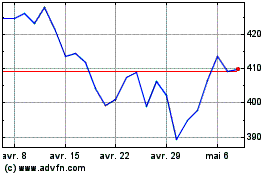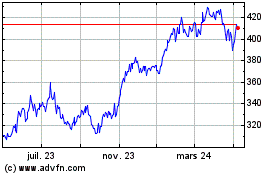Amazon, Microsoft Tighten Grip on Enterprise Tech
19 Mars 2019 - 12:19AM
Dow Jones News
By Angus Loten
Amazon.com Inc. and Microsoft Corp. appear to be tightening
their grip on the enterprise information-technology market, thanks
to a head start in cloud computing and ongoing industry
consolidation, according to market-research firm ETR.
Amazon or Microsoft were cited as the preferred vendors in over
half of the top 30 products and services listed as
information-technology spending intentions by more than 800 chief
information officers and other high-level corporate decision
makers, the firm said, based on survey results gathered since early
March.
The products and services include basic IT needs, such as cloud
infrastructure and software, data analytics, robotic process
automation, artificial intelligence and other emerging digital
tools.
Most survey respondents are from large global firms in a range
of industries, U.S. federal agencies and private firms with more
than 1,200 employees, the ETR report said.
Thomas DelVecchio, founder and chief executive officer of ETR
parent company Aptiviti Inc., said the results show how both Amazon
and Microsoft benefited from getting a head start in the cloud
market.
Amazon and Microsoft are currently the two largest providers of
public cloud services, generating nearly $50 billion a year in
combined revenue, an amount that is expected to double by the end
of 2020.
"But it's not just that AWS and Azure got to cloud faster," Mr.
DelVecchio said, referring to Amazon's and Microsoft's cloud units,
respectively. "They've also continually expanded and offered more
and more, so that users could find everything they need right
there," he added.
He compares the growing allure for CIOs to shopping at a Stop
& Shop: "You go to one place and you've got your butcher and
your baker and other goods. Why go back to your grocer?"
Not everyone is buying in to the one-stop shop strategy.
Marty Boos, CIO of ticket reseller StubHub, owned by EBay Inc.,
said he worries that buying more IT products and services from the
same provider can lead to vendor lock-in.
"I don't want to work with a hundred vendors, but I am very
comfortable with 10 to 15 who can help us innovate and solve
business problems," Mr. Boos told CIO Journal.
Amazon last year spent more than $13.6 billion on technology,
making it the biggest corporate IT spender in the world, much of it
going into servers and other data-center infrastructure aimed at
building cloud services to sell to corporate customers, according
to International Data Corp. Amazon declined to comment.
Microsoft, the fifth biggest spender, invested $9.2 billion in
corporate IT last year, IDC said. Microsoft didn't respond to calls
seeking comment.
Competition among all enterprise IT providers is fueling an
upturn in industry mergers and acquisitions. Both the value and
volume of mergers and acquisitions in the global
enterprise-software sector hit a five-year high last year, coupled
with steady growth across the IT and business services sector,
according to acquisitions advisory firm Hampleton Partners.
Between them, Amazon and Microsoft closed dozens of M&A
deals worth billions of dollars in 2018, ranging from Amazon's
purchase of video doorbell maker Ring to Microsoft's acquisition of
DataSense, a data-management platform for online education
services.
That kind of industry consolidation is likely to continue in the
years ahead, especially if the economy weakens, said David Mitchell
Smith, a vice president and distinguished analysts at Gartner
Inc.
While CIOs often claim to prefer shopping around for the best IT
products and services, Mr. Smith said "they don't always act that
way," adding that it is far easier to get as many tools as you can
in the same place.
Write to Angus Loten at angus.loten@wsj.com
(END) Dow Jones Newswires
March 18, 2019 19:04 ET (23:04 GMT)
Copyright (c) 2019 Dow Jones & Company, Inc.
Microsoft (NASDAQ:MSFT)
Graphique Historique de l'Action
De Mar 2024 à Avr 2024

Microsoft (NASDAQ:MSFT)
Graphique Historique de l'Action
De Avr 2023 à Avr 2024
